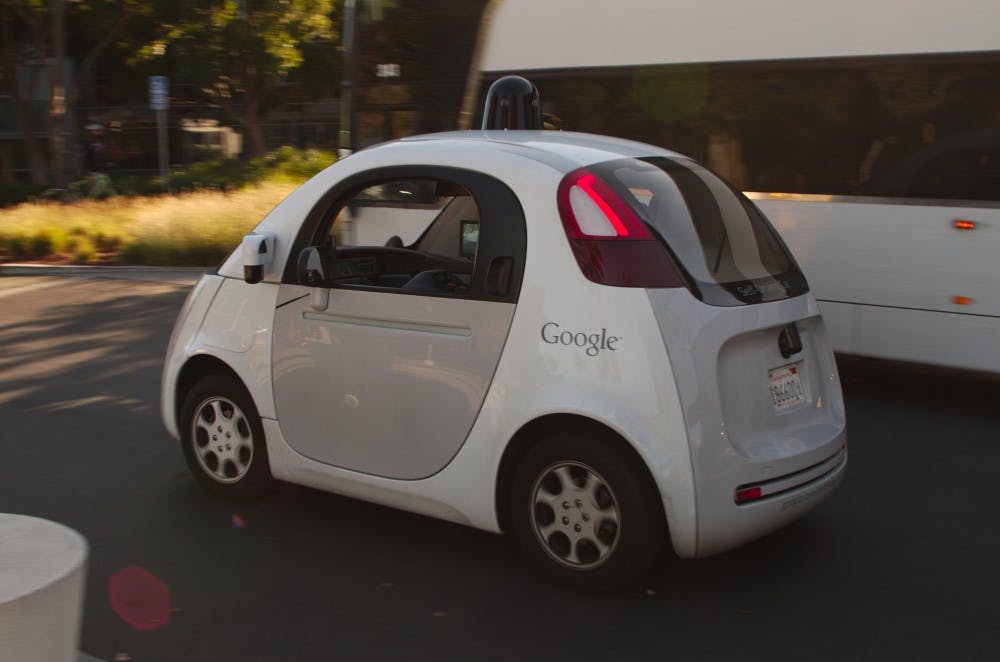“I’ll never trust my life to some robot.” It’s a common human trait — a fallacy — to resist surrendering one’s life to a couple thousand lines of code. People have always desired control over their own lives, but when the alluring new technology of self-driving cars becomes twisted into some dangerous innovation that threatens individual freedom, it necessitates an honest appraisal. Though difficulties lie ahead in perfecting the technology and defining regulatory uncertainties, a blanket opposition to self-driving cars fails to consider the most central promise of the technology — its ability to save lives. Every time a person steps behind the wheel of a car, there’s always a chance of a fatal accident occurring — for self-driving cars, there’s an opportunity to eliminate this threat completely.
I can understand this tepid resistance just as I can understand a senior’s preference for using checks over Venmo, or letters over text messages. Changing the established order of things takes time, even more so when the benefits of such a paradigm shift aren’t fully considered and the threats cited differ sharply along generational lines. Only 48 percent of Americans in a 2015 poll said they would be willing to try a self-driving car. This resistance commonly cites individual crash cases and relative losers in the labor market in articulating a broad condemnation, selectively ignoring trends and the potential for future improvements.
Self-driving technology is not perfect yet by a long shot, but betting against the talent and resources of the United States’ most innovative companies including Tesla, GM, Ford, Apple and Google — all of whom have their own self-driving car programs — does not seem like a prudent investment. Researchers have estimated that self-driving cars will be able to prevent at least 90 percent of roughly 35,000 traffic accidents in the United States every year, saving 300,000 lives over the course of a decade. Concurrent revolutions in batteries, electrical engines and ride-sharing further promise drastically reduced traffic congestion and diminished environmental impact.
One of the core arguments of self-driving opponents centers on the freedom or relaxation that we often feel when driving. The promise of seemingly limitless directional freedom and a machine which accelerates on command can give the impression that the act of driving is what we love so much. The mind-numbing lull of a trip on the highway or the thrill of cruising down the street to a Young Thug banger can be a welcome departure from the bustle of everyday life. But it’s not the act of driving that we love so much, it’s the time spent in the car that we crave. We use this time to think through our problems, share stories with a friend or just unplug from the myriad of screens that vie for our attention. Over and above the ability for self-driving cars to save lives is precious time that this technology can return to people — time which a parent can use to take a nap on the commute home from work, freeing up time for her to play with her kids at home. Time which she no longer has to spend worrying over turn signals, ignoring countless distractions or navigating a minefield of potential car accidents caused by herself or another well-meaning person.
When considering two basic worlds, one where self-driving technology is prevalent and one where no such technology exists, reason dictates preference to the former. The implications of such a world when truly considered assure profound changes to daily life and our economy. DUIs become a thing of the past. Family dynamics are bound to change when the family car can go pick up groceries during the workday or take the kids to and from soccer practice at night. Our economy will certainly expand as millions of hours of lost business and personal productivity are now free to use again. New parking garages are being built with particular dimensions to easily convert the structures into office space or apartments.
The expected decline of car ownership after 2020 will only accelerate as Americans increasingly rely on ride-sharing services in lieu of purchasing a car. Elon Musk has even predicted that self-driving Tesla’s will be able to make an owner money during the day as part of a national ride-sharing and energy network. Despite some of these seemingly beneficial changes, there will naturally be downsides as taxi, Uber and truck-driving jobs diminish with each additional self-driving car on the road. Understanding that self-driving technology is a matter of when not if suggests we should start preparing now for the inevitable creative destruction in the job market, whereby ordinary, hard-working Americans must transition to add value in new areas of the economy. Investments in education and job retraining suddenly become even more paramount.
The resistance to self-driving technology begins at the most basic level with millions of Americans reluctant to trust their life to a car that drives itself. We strive to make our own luck and when we’ve never been in a serious car accident we falsely attribute such a result to individual skill rather than exogenous factors. We must separate what we appreciate about time spent in a car from the realities of the inherent danger of a person getting behind the wheel. Continuing to oppose self-driving car technology becomes increasingly untenable when you stop and think about the millions of lives it will save worldwide and the economic boom it will provide our country. Why drive when you can take five?
Ben Yahnian is an Opinion columnist for the Cavalier Daily. He may be reached at opinion@cavalierdaily.com.







